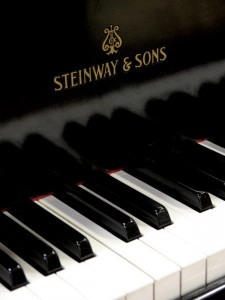 It may seem difficult, initially, to find used Steinway pianos that are for sale. We have found, however, that if you know where to look, the number of used pianos available is enormous, and that there really is as great a selection as, or greater than, there is in the new piano market. Indeed, because many models formerly made have been discontinued, you will find many fine instruments in the used piano market that are no longer available among what is being offered new. Used pianos, of course, won’t all be in one place, but then neither are the new ones. Actually, many piano dealers offer both new pianos and also used ones that were “trade-ins”. Other good sources are classified ads (both private parties and dealers), auctions, estate sales, garage sales, on-line auction sites such as eBay®, other on-line piano listing sites such as Park Avenue Pianos, used piano dealers, piano rebuilders and refinishers, and even piano movers and tuners.
It may seem difficult, initially, to find used Steinway pianos that are for sale. We have found, however, that if you know where to look, the number of used pianos available is enormous, and that there really is as great a selection as, or greater than, there is in the new piano market. Indeed, because many models formerly made have been discontinued, you will find many fine instruments in the used piano market that are no longer available among what is being offered new. Used pianos, of course, won’t all be in one place, but then neither are the new ones. Actually, many piano dealers offer both new pianos and also used ones that were “trade-ins”. Other good sources are classified ads (both private parties and dealers), auctions, estate sales, garage sales, on-line auction sites such as eBay®, other on-line piano listing sites such as Park Avenue Pianos, used piano dealers, piano rebuilders and refinishers, and even piano movers and tuners.
One of the most important points to consider, when looking at used pianos, is condition. This includes the amount of wear and tear on the parts, and the effects of age, environment and use. As a grand piano can have some 10,000 moving parts, and an upright close to 6,000, there are a lot of things that can break or wear out over the years. Pianos, however, do tend to age more slowly than cars, or other mechanical devices, and often a piano may be many years old but have had relatively little use. For comparison, a 10-year-old piano may be in almost new condition, whereas a 10-year-old car may be nearing the end of its useful life. I have seen 50, 60, and even 70-year-old pianos that needed little more than some cleaning and adjustments. On the other hand, if a piano has had heavy use by a piano teacher, or in a school or institution, it may need complete rebuilding and refinishing after as little as 10 years.
In buying a used piano either from a private party or a dealer, most often without the protection of the comprehensive warranties that come with new instruments, you will want to know such things as whether the piano will hold a tuning, and how long it will continue to do so. You will also want to know about the condition of all the moving parts, including felts and strings, and the other structural and tone-producing components of the instrument. Is there wear on the parts? If so, how much, and how will it affect the sound or the touch of the piano? Have moths and rodents eaten into the felts? Has the piano been exposed to excessive heat or moisture, causing rusting of strings, tuning pins, and other metal parts, or cracking of wooden ones? Will parts need to be replaced soon? Or can those parts continue to be used for several years with just some adjustments? Will repairs be needed right away in order to make the piano playable? If so, will they be expensive? If it is a piano that needs rebuilding, can it be rebuilt, and will the ultimate value justify the cost of the rebuild? How long can it be expected to last after rebuilding? Is the piano one that is easy to service, or does it have archaic or poorly designed parts that will be difficult or costly piano to maintain?
In addition you will probably want to know whether the piano was a good one to begin with. Some pianos are designed and built for artists and performers, others are made simply to fill a furniture need.
Whenever considering buying a used piano, and even with many new pianos, you should have it checked out (appraised) first by a competent piano tuner or technician.
Article Source: http://www.pianofinders.com/educational/shortguide.htm
